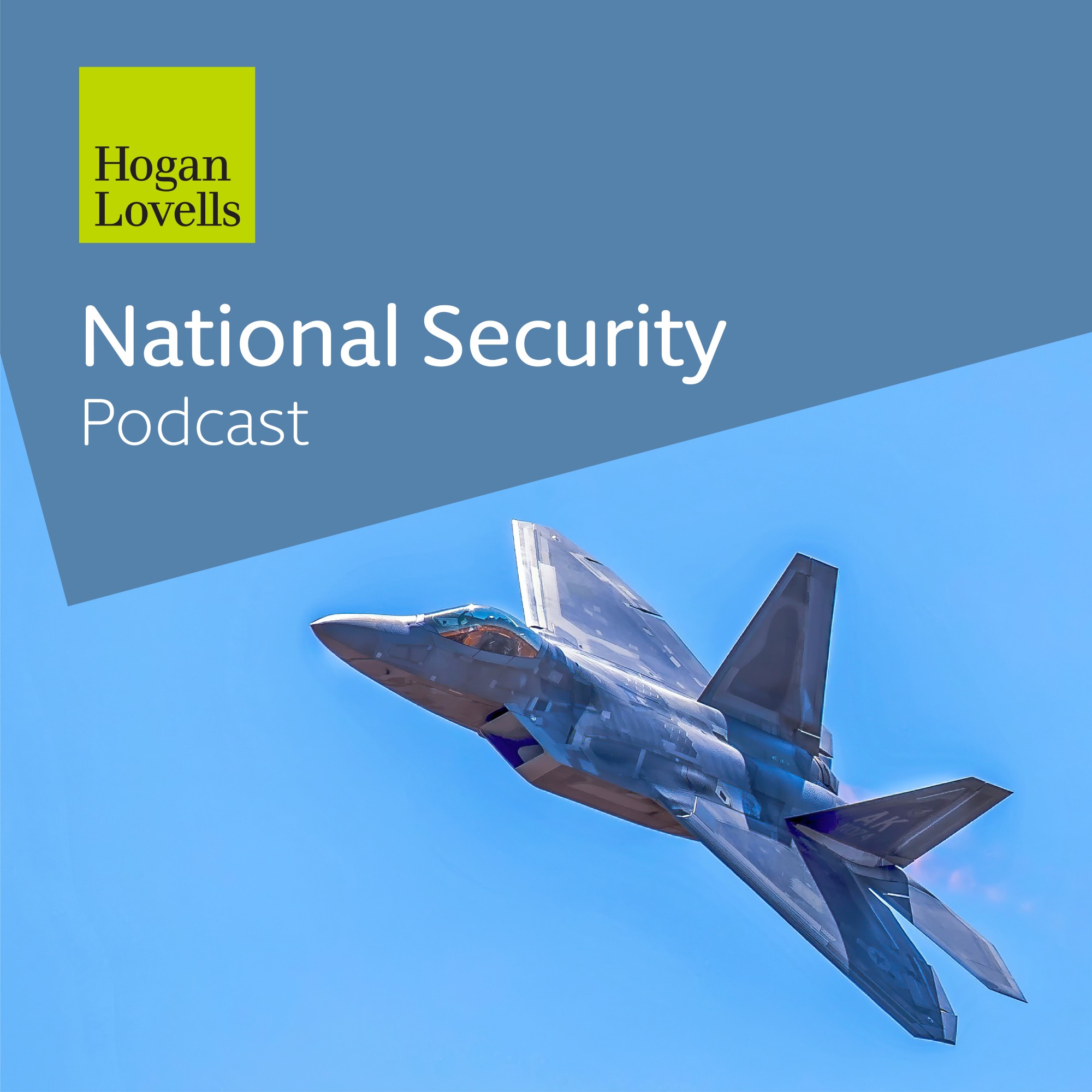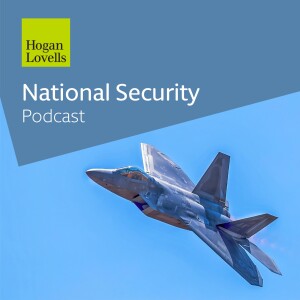The Hogan Lovells National Security Podcast

In this age of rapid technological advances, having a dedicated team of lawyers to help navigate the challenges and threats of national security is crucial. At Hogan Lovells, national security is baked into virtually all practice areas and industries, from clothing affected by the Uyghur forced labor bill, or the myriad impacts of the Ukraine war, or political conditions in a country of importance to a client. The Hogan Lovells National Security Podcast, hosted by Mike Scheimer and Tim Bergreen, will provide an overview of key developments as well as informative segments on issues that are affecting the day-to-day goals of businesses and organizations.
In this age of rapid technological advances, having a dedicated team of lawyers to help navigate the challenges and threats of national security is crucial. At Hogan Lovells, national security is baked into virtually all practice areas and industries, from clothing affected by the Uyghur forced labor bill, or the myriad impacts of the Ukraine war, or political conditions in a country of importance to a client. The Hogan Lovells National Security Podcast, hosted by Mike Scheimer and Tim Bergreen, will provide an overview of key developments as well as informative segments on issues that are affecting the day-to-day goals of businesses and organizations.
Episodes
Episodes



Friday Jun 14, 2024
Episode 24: In-Q-Tel and Investing in National Security
Friday Jun 14, 2024
Friday Jun 14, 2024
In this episode, we sit down with Steve Bowsher, the CEO of In-Q-Tel, the non-profit venture capital firm supporting the intelligence community. Steve shares his extensive background and provides an inside look at In-Q-Tel's mission to bridge the gap between the intelligence community and technological innovation.
We discuss the process by which In-Q-Tel identifies and invests in emerging technologies, supports startup companies, and accelerates the deployment of critical capabilities to U.S. government agencies. We explore the unique ways In-Q-Tel operates and the types of technologies it seeks including AI, cybersecurity, unmanned systems, and cutting-edge biotechnology. We also discuss how industry partners can connect with In-Q-Tel and pitch their technologies.
Tune in to learn more about the vital role In-Q-Tel plays in ensuring technological advancements serve both commercial and government needs, and what lies ahead for this innovative organization.



Friday May 31, 2024
Episode 23: Japan and International Security
Friday May 31, 2024
Friday May 31, 2024
In this episode, we cover the long standing alliance between the United States and Japan, and its future trajectory in the face of regional and global security challenges. We discuss Japan’s evolving defense posture, highlighting significant changes since Japan’s introduction of new national defense strategies in 2023 and an increase in military spending. We explore the implications of Japan's evolving role in regional security in the Indo-Pacific, particularly in response to China's growing power and North Korea's missile program. The episode also covers Japan's potential future participation in alliances such as the Five Eyes and AUKUS, and the challenges and opportunities for Japan's defense industrial base. Finally, we spotlight recent legislative changes in Japan establishing a government security clearance program, which marks a significant step towards deeper integration with global security frameworks. Tune in to gain a deeper understanding of how these developments shape the strategic landscape in the Indo-Pacific and beyond.



Thursday Apr 11, 2024
Episode 22: European defense strategy and global security implications
Thursday Apr 11, 2024
Thursday Apr 11, 2024
Returning after our long winter break, in this episode (recorded on NATO’s 75th Anniversary) we are joined by our colleague Falk Schoening from our Brussels office to discuss the European Union's (EU) €1.5 billion plan to boost defense production and the release of the EU’s first-ever defense industrial strategy. We highlight the EU's transition towards addressing security challenges collaboratively, and the significance of the EU defense strategy as a departure from previous civil-centric approaches. We explore cross-border procurement challenges and efforts to streamline regulations and foster collaboration to enhance defense industrial capabilities among EU members. We also talk about capital flows into Europe and increasing investment in defense companies after years of underinvestment at a time when current security threats are generating a greater sense of urgency. The conversation extends to Europe's role in supporting Ukraine amidst geopolitical tensions, including Germany's supply effort. We touch upon Europe's perspective on US-China tensions and the implications for EU-China relations. Finally, we discuss Europe’s preparedness for potential U.S. policy shifts ahead of this year's U.S. election.



Friday Dec 22, 2023
Episode 21: U.S.-China relations and the global economy
Friday Dec 22, 2023
Friday Dec 22, 2023
In this episode, we are joined by our colleague Ben Kostrzewa from our Hong Kong office, who brings extensive experience in navigating the complex landscape of U.S.-China trade relations, export control, sanctions, and investment restrictions.
We discuss President Biden's recent bilateral meetings with Xi Jinping in San Francisco, signaling prospects for future discussions, albeit with lingering concerns over potential conflict triggers. We also delve into China's economic setbacks post-COVID, including a notable downturn after decades of consistent growth, and we look at Hong Kong's evolving role within China's economy and highlight Hong Kong’s enduring advantages for businesses operating in the region. Finally, we look ahead to 2024, where we consider Taiwan's January presidential election and China's economic trajectory as potential challenges for the future.
The recent Biden – Xi meetings were held at the same time as the APEC and IPEF forums in San Francisco. See our related episode with Kelly Ann Shaw on APEC/IPEF here.



Friday Dec 08, 2023
Episode 20: U.S. Reactions to APEC and IEPF Summits
Friday Dec 08, 2023
Friday Dec 08, 2023
In this episode, we are joined by our colleague Kelly Ann Shaw to discuss reactions to the Asia-Pacific Economic Cooperation (APEC) Summit and Indo-Pacific Economic Framework (IPEF) forums recently held in San Francisco. Kelly Ann shares her own experiences as the lead U.S. negotiator for APEC during the Trump administration, and we share insights into the complexities of trade negotiations, geopolitical dynamics, and the challenges faced by the Biden administration in the context of APEC and IPEF.
See our prior episode with Kelly Ann here.



Tuesday Nov 07, 2023
Episode 19: U.S. expanded export controls on semiconductors
Tuesday Nov 07, 2023
Tuesday Nov 07, 2023
We are joined by our colleague Ajay Kuntamukkala on this one-year anniversary of the October 2022 semiconductor export control rules to discuss two new interim final rules (IFRs) by the Bureau of Industry and Security (BIS) aimed at closing perceived loopholes in the 2022 restrictions.
The first IFR covers restrictions on advanced computing items and supercomputers (available here), and the second IFR covers restrictions on semiconductor manufacturing equipment (available here) – both of these rules become effective on November 17, 2023.
We unpack how these new rules amend the Export Administration Regulations (EAR) with new restrictions on the export, reexport or transfer (in-country) of certain semiconductor and advanced computing items to China and Macau, as well as expanding license requirements for semiconductor manufacturing equipment to additional countries. We analyze the new licensing requirements imposed on entities that may be operating worldwide but that are “headquartered in” (a term not yet defined in the EAR) certain listed countries. We consider the expansion of the U.S. persons rule, dive into the technical details of the new parameters (lowered thresholds) that determine restricted chips, and discuss export control harmonization among allied countries, including recent Dutch export controls issued in September. Finally, we tackle how the new rules might impact the U.S. chip industry as well as China’s own burgeoning chip industry (we also flag the recent release of the latest Huawei smart phone).



Thursday Oct 12, 2023
Episode 18: Innovation and DoD Replicator Initiative
Thursday Oct 12, 2023
Thursday Oct 12, 2023
In this episode we discuss defense innovation and DoD’s announcement of the “Replicator” initiative. We explore the history of the Defense Innovation Unit (DIU) and how its success has sparked the creation of similar offices throughout DoD. We explain efforts to overcome the “valley of death” between developing an idea and deploying a capability to the warfighter. We also touch on In-Q-Tel and other government seed capital programs, incubators, technology accelerators, challenge programs, and the Defense Innovation Marketplace. We review Deputy Secretary of Defense Hicks' announcement of “Replicator” whose goal is to field “attritable” autonomous systems at a scale of multiple thousands, in multiple domains (air, land, sea, space), within the next 18-to-24 months. Finally we touch on similar efforts in other countries, including the NATO DIANA initiative to bring together personnel and tech startups and scientific research to solve critical defense challenges among the alliance countries.
Read Hicks' speech here.
Access the DoD innovation site for industry here.


